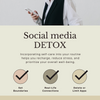
The Importance of a Digital Detox: How and Why to Unplug
, by Paul Walker, 3 min reading time

, by Paul Walker, 3 min reading time
In today’s hyper-connected world, it’s hard to imagine a moment without our devices. Smartphones, laptops, tablets, and smartwatches have become extensions of ourselves, keeping us tethered to the digital sphere. While technology has undoubtedly revolutionized the way we live, work, and connect, its constant presence can also have adverse effects on our mental, emotional, and even physical well-being. This is where a digital detox comes in. Taking time to unplug can be a transformative experience, offering a host of benefits that rejuvenate the mind and body.
A digital detox involves deliberately stepping away from electronic devices and screens for a designated period. This break can range from a few hours a day to a full weekend or even longer. The goal is to create space for non-digital activities and to reconnect with the present moment, fostering mindfulness and balance.
Constant notifications, emails, and social media updates can create a sense of urgency and overwhelm. Studies show that prolonged exposure to digital interactions can increase cortisol levels, the body’s stress hormone. A digital detox allows your mind to rest, reducing stress and promoting a sense of calm.
Blue light emitted by screens interferes with the production of melatonin, the hormone that regulates sleep. This can lead to poor sleep quality or insomnia. By disconnecting from devices, especially before bedtime, you can establish a healthier sleep routine and wake up feeling more refreshed.
Multitasking between apps, notifications, and work tasks can fragment attention, leading to reduced productivity. Unplugging gives your brain a chance to focus on one task at a time, improving efficiency and the quality of your work.
Digital devices can sometimes act as barriers to meaningful relationships. A digital detox encourages face-to-face interactions, deepening your connections with family, friends, and even yourself.
Stepping away from screens allows your mind to wander and explore new ideas. Engaging in non-digital activities, such as journaling, drawing, or taking a walk in nature, can reignite your creativity.
Digital distractions often pull us out of the present moment. A detox helps you become more mindful, making it easier to appreciate simple joys and maintain mental clarity.
Set Clear Goals Decide why you want to detox and what you hope to achieve. This could be improved mental health, better sleep, or simply more quality time with loved ones.
Start Small Begin with manageable steps, such as turning off notifications, designating tech-free zones in your home, or committing to screen-free evenings.
Schedule Detox Periods Choose specific times for your detox, such as weekends, vacations, or daily periods like mealtimes or the hour before bed.
Engage in Offline Activities Plan activities that don’t involve screens. Go for a hike, read a physical book, cook a new recipe, or engage in a creative hobby.
Use Tools to Help If going cold turkey feels daunting, apps like “Focus” or “Forest” can help limit your screen time gradually.
Communicate Your Plan Inform friends, family, or colleagues about your detox to manage expectations and gain their support.
During a digital detox, you might initially feel restless or experience FOMO (fear of missing out). However, this is a sign of your reliance on technology and an opportunity to break free from it. Over time, you’ll likely feel more grounded, present, and energized. The mental space created can lead to new insights, enhanced emotional well-being, and a greater appreciation for the world around you.
A digital detox isn’t about rejecting technology altogether but finding a healthier balance. By stepping away from screens, even for a short while, you can rediscover the richness of life offline and create a sustainable relationship with your devices. In a world that never stops buzzing, sometimes the most revolutionary act is simply to unplug.